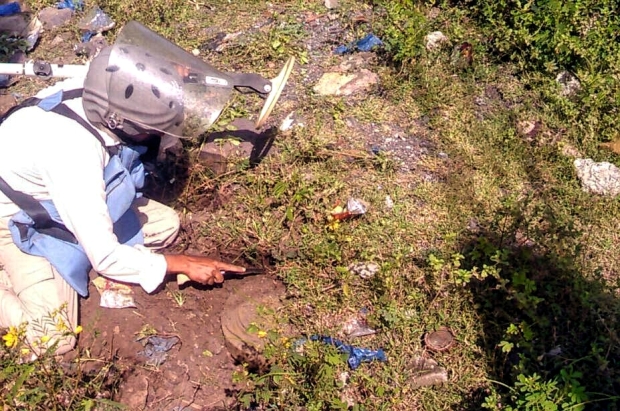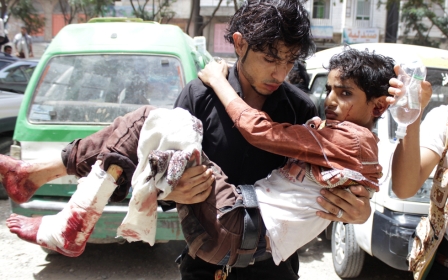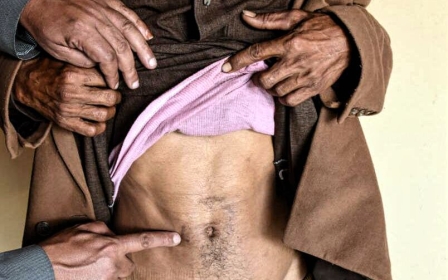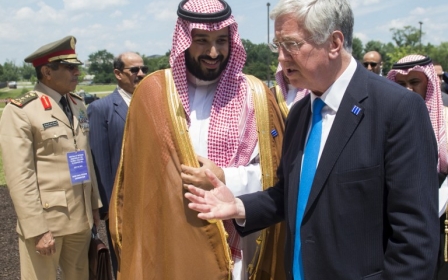Poverty kills: The Yemenis defusing missiles for money
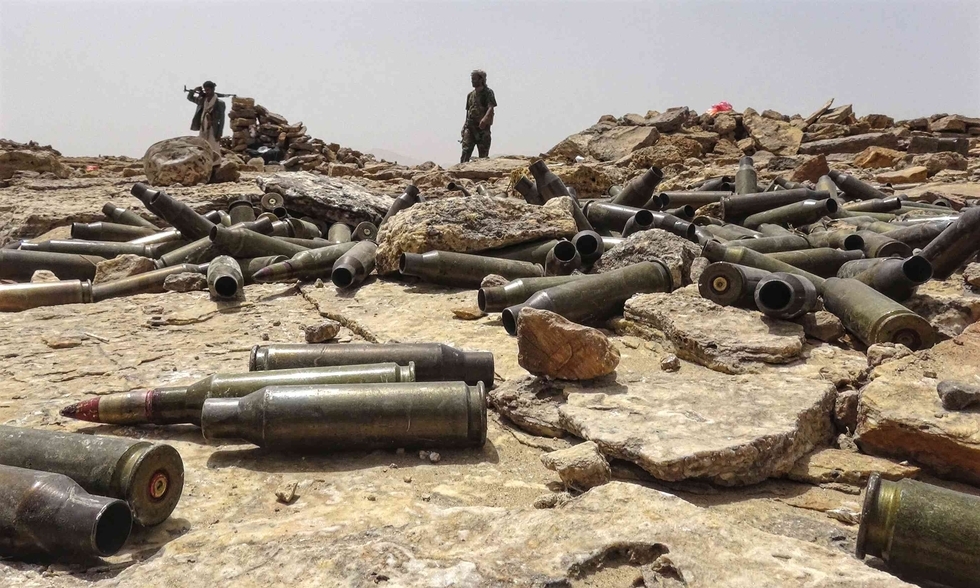
TAIZ, Yemen - Plastic bottles. Brass screws. Copper wiring. Motaz al-Doola would collect everything - and anything - that could be recycled to sell on and buy food for himself and his six-strong family.
A member of Yemen’s marginalised Muhamashin minority, the illiterate 28-year-old used to earn YR1,000 ($2.70) on a good day from the scraps that he scavenged.
But when war broke out in 2015, al-Doola was lucky to pull together 80 cents. The average monthly wage in Yemen is about $50 per month.
Fellow residents in Taiz headed for the countryside or other provinces in Yemen to avoid the conflict. But with no hope of finding proper work in safer areas, Doola remained. Instead he resorted to foraging for scrap metal amid the unexploded remnants of war, risking his life to gather metal extracted from missiles and bombs.
He resorted to foraging for scrap metal amid the unexploded remnants of war, risking his life to gather metal extracted from missiles and bombs
His wife Fakhria said that Doola knew the dangers of what he was doing but that he had no choice. It paid.
"During the war, sometime Motaz used to sell metals for $16.20 and sometimes he did not find anything,” she said. “But we could sometimes earn more than $162 per month. That is why needy people collect metals from the remnants of war."
In April 2017, Doola's luck ran out. A rocket killed him as he tried to extract copper from it 5km west of Taiz near Air Defence hill.
His family was left with no means of support. Fakhria said: "My children sleep without dinner and no one helps, but when authorities knew about the work of Motaz last year, soldiers came and threatened him not to go to conflict zones to collect metals.
"They prevent us from working in dangerous areas but they do not help us," she said. The situation worsened after Doola's death. "So I asked my children, who are under 10, to collect scrap plastic and metals from safe areas."
Unexploded missiles
The desperation that drove Doola and other Yemenis to pull apart live munitions is evident from the statistics. Before war came in 2015, almost half of all Yemenis already lived below the poverty line, two-thirds of youths were unemployed and social services were on the verge of collapse.
Three years of conflict have only worsened those figures. Now seven million people now do not know where their next meal is coming from.
About 3.3 million children and pregnant or breastfeeding women are acutely malnourished, including 462,000 children under five who face severe acute malnutrition. That's a 57 percent increase since late 2015, threatening the longer-term prospects of those affected, according to the UN.
The Yemen Executive Mine Action Centre (YEMAC) is a government institution that also works with NGOs such as UNICEF to educate the population on armaments.
"Five people were breaking up a missile after an air strike inside a camp in the Taiz' al-Ganad area in August," he said. "The missile exploded and killed all five of them.
"Most howitzer and Katyusha rockets and mortars did not explode when fired," he said. Instead, they lay on the ground, a fatal risk for returning residents.
There are no accurate figures on the quantity of armaments which have been dropped on, exploded in or fired into Yemen during the conflict. But the Yemeni Coalition for Monitoring Human Rights Violations (YCMHRV) says it defused 39,634 landmines during 2015 and 2016 - including 26,755 anti-personnel landmines.
In 2015, at least 988 people were killed or wounded by landmines or other explosive remnants in Yemen, according to the Landmine Monitor initiative launched by the International Campaign to Ban Landmines.
They sacrifice their lives trying to extract metals from explosive remnants of war. People need to be aware that scrap metals can kill them
- Basem al-Ariqi, Yemen Executive Mine Action Centre
Basem al-Ariqi is manager of awareness at the Yemen Executive Mine Action Centre in Taiz province. Mortar rounds only have a range of about eight kilometres, he said. It prevents them from reaching residential areas, where they will be of most danger.
“Only those who go into those areas put themselves in danger. Most mortar missiles have yet to explode. Their effects will be felt when residents from the conflict zones return to their homes.
"But howitzer and katyusha rockets can fall outside conflict zones," he said, "and they fall into the hand of civilians, despite the army doing their best to clear them from residential areas."
Children as well as adults are engaged in the recycling business, he said. "The dire need for money means that desperate people don't inform the authorities about missiles. Instead they sacrifice their lives trying to extract metals from explosive remnants of war. People need to be aware that scrap metals can kill them."
The National Mine Action programme, a government body, has implemented two campaigns in Taiz warning civilians about the dangerous of the explosive remnants, according to Ariqi, with a third aimed at residents in Taiz.
The wrong sacrifice
A kilo of brass in Yemen currently sells for $3.20. A kilo of copper is worth $4.80. Plastic? Only eight cents.
The raw material is sold on to buyers like Ahmed Mada, who recycles them, then sells them on at a profit of up to 30 percent.
"I have worked in this business for more than 20 years," he said. "Collecting scraps is the work of people in need. It was difficult even before the war as people look for scrap metals in the rubbish or buy them at cheap prices from people."
He tells his scrap collectors to take care, to avoid dangerous areas, as their lives are more important than anything else. They have families who rely on them, he says. "I hope not to hear about people who sacrifice themselves to collect scrap metals."
Motaz Doola’s wife agrees – but believes that desperate people will not care about their safety if they see their children are starving to death. Her husband did not kill himself, she said, for the sake of work but because he could not bear to see his children suffering.
"I just hope that organisations and the government will help, so needy people stop sacrificing themselves for the sake of money."
This article is available in French on Middle East Eye French edition.
Middle East Eye propose une couverture et une analyse indépendantes et incomparables du Moyen-Orient, de l’Afrique du Nord et d’autres régions du monde. Pour en savoir plus sur la reprise de ce contenu et les frais qui s’appliquent, veuillez remplir ce formulaire [en anglais]. Pour en savoir plus sur MEE, cliquez ici [en anglais].


